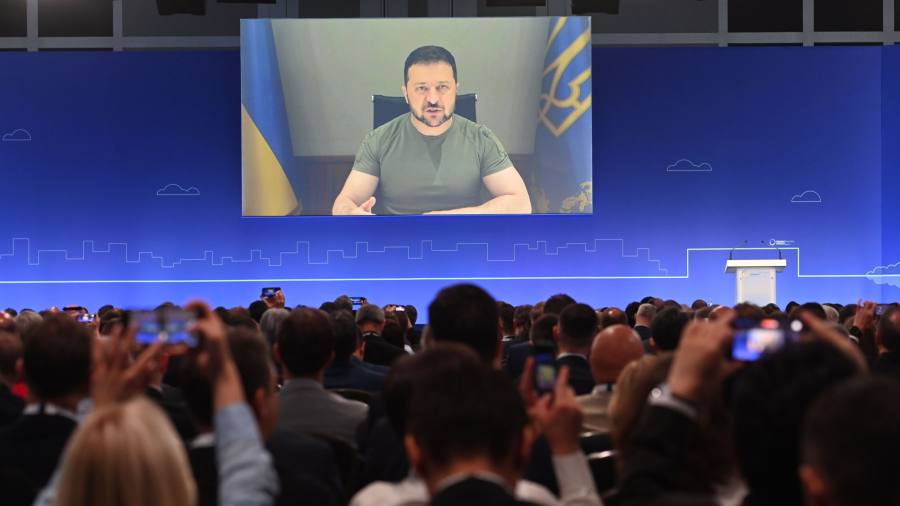President Volodymyr Zelenskyy appealed to his allies to start funding “real projects” for his country’s reconstruction at a summit in London dedicated to spurring a Ukrainian recovery.
“We must move from vision to agreements and from agreements to real projects,” Zelenskyy told foreign ministers, Ukrainian officials, bankers and development experts at the Ukraine Recovery Conference in London by video link.
“Every new day of Russian aggression brings new ruins,” Zelenskyy said.
The World Bank estimated in March that the cost of reconstruction and losses to the Ukrainian economy from Russia’s war stood at $411bn with $14bn needed for priority repairs this year.
The conference is intended to encourage private sector-led investment in Ukraine’s recovery, including by expanding publicly subsidised insurance to cover war risks for investors.
“The war has proved how much Ukraine has to offer,” said UK prime minister Rishi Sunak.
However, progress is expected to fall short of Ukrainian hopes for G7-funded insurance covering billions of dollars of private investment.
UK officials said the event was not a “pledging conference” but that individual pledges from governments and announcements of loans from international financial institutions would allow Ukraine to approach the $14bn need for priority repairs and investments.
US secretary of state Antony Blinken said Washington was sending an additional $1.3bn in aid to strengthen Ukraine’s energy grid, modernise and expand its border and port infrastructure to ease export flows and subsidise war risk insurance.
The EU said it would provide €50bn in grants and loans over the next four years. The UK will give £3bn in guarantees to the World Bank to expand its lending to Kyiv.
European Commission president Ursula von der Leyen said Brussels would present proposals by the end of July on using seized Russian assets to help pay for Ukraine’s recovery.
Brussels on Wednesday said Kyiv met two of the seven EU benchmarks demanded by the bloc before starting membership negotiations. The reforms are seen as vital to improving the business environment, with von der Leyen saying Ukraine’s progress would “send a powerful message to international investors”.
G7 countries and IFIs have formed a “multi-donor platform” to co-ordinate their aid to Kyiv but some Ukrainian officials have voiced frustration that it is too bureaucratic and not as focused on practical outcomes as the Rammstein group marshalling military aid.
Ukrainian officials say that a push to stabilise the economy and salvage private sector activity will yield tax revenues to finance their war effort.
“We can pay salaries from soldiers only from taxes,” said Oleksandr Kubrakov, deputy prime minister for recovery. “Nobody knows how long this war will last. It is critical to start the recovery.”
Ukrainian businesses have been resilient but many are in financial distress due to a punishing 25 per cent interest rate and a lack of collateral. A survey for the World Bank found that 69 per cent of large Ukrainian companies are expected to be in arrears in the next six months. 75 per cent of exporters have experienced a drop in exports due to logistical problems.
The Ukrainian government lacks expertise in planning and managing capital projects, creating bottlenecks for reconstruction, say development bank officials.
“Building capacity in Ukraine is really important,” said Anna Bjerde, managing director for operations at the World Bank. She pointed out that Ukraine’s capital spending amounted to $4bn-5bn a year before the full-scale invasion. Now it would have to manage several times that sum.
Kubrakov said his country did not lack skilled personnel but that the effort of complying with the procedures of international financial backers had grown enormously. Kyiv has asked donors to take charge of procurement on some projects to ease the burden.
Donors and lenders are also stepping up their tracking procedures to prevent corruption.
Most of the $23bn disbursed to Kyiv since February 2022 by the World Bank has been paid to Ukraine’s finance ministry, which has a “robust financial tracking system”, said Bjerde. “When we move into other sectors we need to be really cognisant of the corruption risks.”
The EU commission will establish an independent audit board to report on suspected mismanagement of public funding and weaknesses in control.
Ukrainian officials meanwhile are touting technology as a way of reassuring donors and lenders about fraud and corruption risks. The government says it will deploy a suite of digital applications and tools, known by the acronym DREAM, to manage contracts and track money. It includes the digital public procurement system known as Prozorro, which provides full transparency of contracts, and is credited by anti-corruption activists for cleaning up government purchasing.
“At some points, Ukraine is more transparent than our partners,” said Danylo Mokhanov, one of the team behind the DREAM initiative.
Additional reporting by Henry Foy in Brussels
Read the full article here




